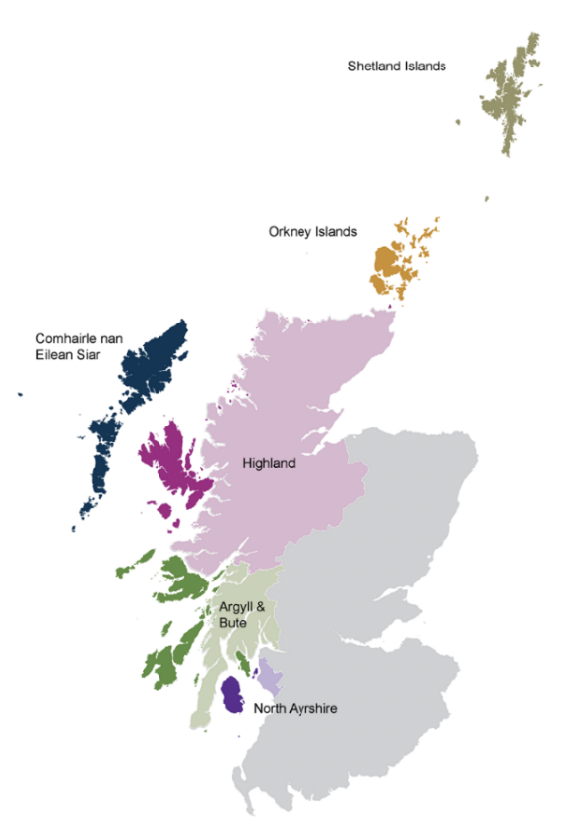Pension Age Winter Heating Payment: Island Communities Impact Assessment (ICIA)
The Island Communities Impact Assessment (ICIA) carried out in relation to the Winter Heating Assistance (Pension Age) (Scotland) Regulations 2024
Key Findings
29. This section provides an overview of issues for Scottish island communities that are relevant for the introduction of PAWHP.
30. Island stakeholders have emphasised the importance of understanding the island experience. Every island is uniquely different with regards to its infrastructure, geography, and demography and therefore, each island has its own specific considerations and constraints.
31. At the time of the 2011 Census, Scotland had 93 inhabited islands with a total population of 103,700 (2% of Scotland's population) as per 2011 Census[6], across 6 local authorities. Of these islands, only five are connected to the Scottish mainland by bridge or causeway[7]. The Islands Act, Part 4 (Section 20 (2), identifies six local authorities representing island communities - Argyll and Bute Council, Comhairle Nan Eilean Siar(Western Isles), Highland Council, North Ayrshire Council, Orkney Islands Council, and Shetland Islands Council. Amongst them, Orkney, Shetland and Western Isles are entirely island authorities, while Highland, Argyll and Bute and North Ayrshire cover island regions as well as mainland regions.
32. PAWHP will provide older people on relevant benefits with the same level of support as is currently available, as the payment will mirror the current WFP eligibility criteria. However, further guaranteed support is also available to people of pensionable age in Scotland who are in receipt of Pension Credit through the Scottish Government’s Winter Heating Payment (WHP).
33. However, the recent changes to WFP eligibility criteria and their implementation for PAWHP are likely to have some impact. The changes to WFP eligibility will reduce the Block-Grant Adjustment associated with devolution of the UK’s WFP by an estimated £150 million in 2024-25, over 80% of the cost of the Scottish Government’s new replacement benefit. This change is expected to reduce the number of individuals in Scotland entitled to a payment by roughly 900,000, with between 110,000 and 130,000 pensioners remaining eligible for payment in Scotland this winter.
34. Initial analysis suggests that Scotland’s proportion of Pension Credit claimants is marginally higher than that in the rest of the UK, with respect to State Pensions (about 12% for the rest of UK, and 12.8% for Scotland). Nonetheless, take-up of Pension Credit is the lowest of all benefits (caseload take-up of 66%) and therefore the restriction of eligibility to those in receipt of Pension Credit risks contributing to a double impact on some of the most vulnerable pensioners in rural and island communities, who do not take up their Pension Credit entitlement and will therefore also lose entitlement to PAWHP. While Scottish Ministers have no formal role in the administration of reserved benefits, the First Minister wrote to councils and COSLA seeking their urgent assistance to promote the take-up of Pension Credit, which is the main qualifying benefit for our older people to receive a Pension Age Winter Heating Payment.
35. Although analysis is not currently available on the impact of this change to rural and island communities specifically, this general reduction in caseload is likely to impact pensioners who are not eligible for Pension Credit, or who do not take up their entitlement, but still face financial difficulties.

Contact
There is a problem
Thanks for your feedback